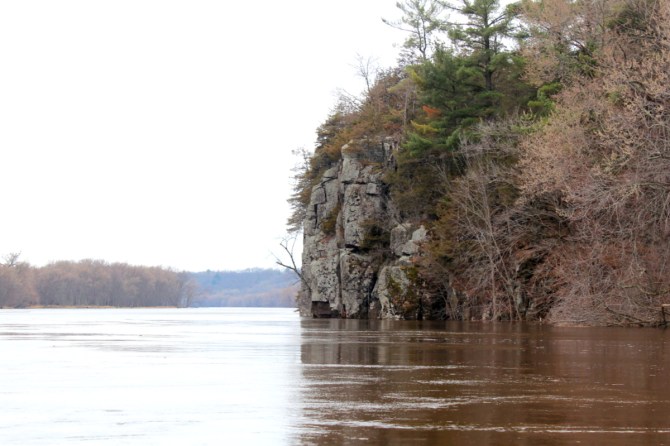Note: In case it isn’t obvious, current river conditions are not for everyone. Or many people. The water is cold and fast and one little mistake can cost you. Please respect the river and enjoy it carefully. In a month or two. At your own risk.

The last time I was on the river was a windy and gray day last November. We fought a stiff wind downstream, the banks gray and brown. It wasn’t the kind of day you would normally choose for a paddle, but with winter bearing down, we weren’t in a position to be picky. Solitude was abundant.
Then, after the winter that froze the river deeply, and caused a major cabin fever outbreak, ice-out miraculously arrived. And an old paddling friend came home for a visit. And my wonderful wife and kid left me alone for a weekend. And I went back to the St. Croix.
The day after last November’s trip, India launched a probe to Mars, a mighty big deal for a nascent space program. Two days before we returned to the river, Mangalyaan reached its halfway point to the red planet, having traveled 24 million miles while I sat on Earth, landlocked.
So we went canoeing, even with the forecast again for cold and clouds, and the river flooded, and the water thirty-six degrees and the current fast. Gabe and Ryan and Slim, two canoes, and me, headed upriver on Saturday morning.

We didn’t have to carry the canoes far from our cars to get them in the water; the river was lapping at the parking lot at the landing. This would be a mandatory life jacket and wits-about-us day, but it would be the river.
We pushed off into the current and set down our paddles again, imagining we wouldn’t have much use for them. The two guys in the bows took that idea to heart while us sternmen ruddered and ferried to keep us on track.
The river carried us along quickly. We passed through the Franconia bluffs, admiring the ancient artistry of the rocks up-close, thanks to water that was five feet higher up the cliffs than the last time I’d passed through.
We stopped on a backwater island and stood stretching cold muscles and talking. We all attended kindergarten or first-grade together in Stillwater almost thirty years ago. I looked at the three guys standing next to the river and saw four of my oldest friends.
The backwater where we paused is an anomaly on the St. Croix. It is home to two things absent from most of the river’s plentiful side channels: hills and rocks. Piles of glacial stone adorn the islands, painted with lichen.

Aflight, afloat
The first trip of the year has previously been dubbed the Annual Waterfowl Harassment Tour, with all respect to our feathered friends. It is good to have them home again, but they don’t seem to appreciate the reunion much. Often we will jump dozens of pairs of ducks, especially wood ducks, and geese out from the banks where they are propagating the next generation of their species. But with the river high and the date early, they weren’t on their nests yet, but the valley was full of life.
This day, the birds were sandhills seen and heard, abundant immature eagles, and a bold fox sparrow Gabe spotted in highbush cranberry near one of my favorite spring-fed waterfalls. And Great Blue Herons.
This stretch of river is good for spring trips because of the heron rookery in a backwater along the way. Sometimes it is a prehistoric din, the big birds squawking and flapping on their nests high in the trees. This day it was quiet, though nearly every nest hosted a tall and slender bird standing on its edge. Perhaps it was the males showing off their homemaking skills to that season’s potential mates.
Time travel
A river distorts time and space. The human brain’s default is to look at a route and see perhaps forty feet to make a turn, but you only have twenty feet as the current takes its share. It may look like thirty seconds to pass downstream of one tree and above another, but when riding a river, it might be twenty seconds, or ten, but never more.
So we arrived at our takeout, twelve or so miles downstream from our start, in the number of hours that six miles might normally take. It was the same landing where last November’s trip concluded. That day, I had left slowly, reluctant to turn my back on the river.
But as we headed out, I was smiling because I should be back many more times before that Indian spacecraft reaches Mars orbit in September.








